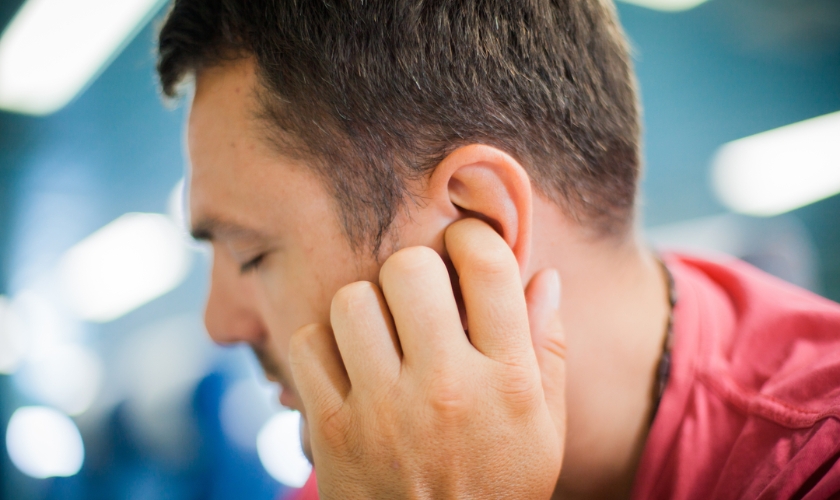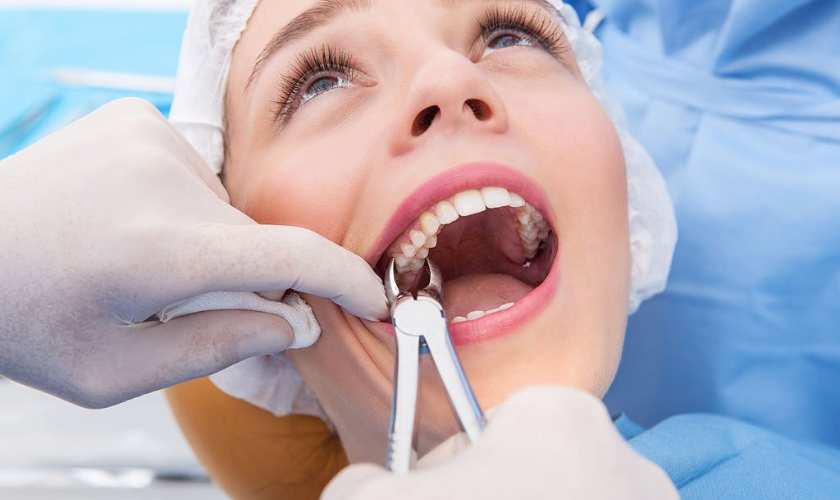$99 New Patient Special - Includes Exam, X-Ray and Basic Cleaning
Is It Normal To Have Ear Pain After Wisdom Teeth Extraction?

Wisdom teeth extraction is a common dental procedure for millions worldwide. The focus is often on recovery at the extraction site. Many individuals may experience unexpected symptoms, such as ear pain, after the procedure. This comprehensive guide explores the relationship between wisdom teeth extraction and ear pain. We will address common concerns and provide insights into managing discomfort during recovery.
Understanding Wisdom Teeth Extraction: Before delving into the specifics of ear pain post-wisdom teeth extraction, it’s essential to grasp the basics of the procedure itself. Wisdom teeth, also known as third molars, typically emerge in late adolescence or early adulthood. However, due to factors like inadequate space in the jaw or misalignment, these teeth often become impacted, leading to pain, infection, and other oral health issues.
Wisdom teeth extraction is recommended when these problems arise, aiming to alleviate discomfort and prevent further complications. The procedure involves the surgical removal of one or more wisdom teeth under local or general anesthesia, depending on the complexity of the case.
Common Post-Extraction Symptoms: Following wisdom teeth extraction, patients commonly experience a range of symptoms as part of the healing process. These may include:
- Pain and swelling at the extraction site
- Bleeding or oozing from the gums
- Jaw stiffness and soreness
- Difficulty opening the mouth fully
- Facial bruising or discoloration
- Sensitivity to hot or cold temperatures
- Difficulty eating or chewing certain foods
While these symptoms are expected and typically subside within a few days to a week with proper care, some individuals may also report ear pain or discomfort during the recovery period.
The Connection Between Wisdom Teeth Extraction and Ear Pain: Ear pain following wisdom teeth extraction may seem unrelated at first glance, but there are several reasons why it can occur:
- Nerve Pathways: The nerves in your mouth and jaw closely connect to those in your ears. During the extraction process, especially if the wisdom teeth are impacted or deeply rooted, the dentist manipulates the surrounding tissues and nerves. This manipulation can trigger referred pain that radiates to your ears.
- Inflammation and Swelling: Surgical trauma to the tissues surrounding the extraction site can lead to inflammation and swelling. This swelling may extend beyond the immediate area, affecting nearby structures such as the temporomandibular joint (TMJ) and the Eustachian tube, which connects the middle ear to the back of the nose and throat. Inflammation in these areas can manifest as ear pain or pressure.
- Sinus Involvement: The upper wisdom teeth roots are in close proximity to the sinuses. In some cases, especially with upper wisdom teeth extractions, there may be sinus involvement or sinusitis following the procedure. This can result in symptoms such as nasal congestion, sinus pressure, and ear pain due to the interconnectedness of the sinus and ear cavities.
Managing Ear Pain After Wisdom Teeth Extraction: While ear pain following wisdom teeth extraction can be discomforting, it is often temporary and resolves as the healing process progresses. However, there are several strategies to alleviate discomfort and promote recovery:
- Pain Management: Over-the-counter pain relievers such as ibuprofen or acetaminophen can help alleviate ear pain and reduce inflammation. It’s essential to follow the recommended dosage and consult with your dentist or oral surgeon if you have any concerns or if the pain persists.
- Cold Compress: Applying a cold compress to the affected side of the face can help reduce swelling and numb the area, providing relief from ear pain and discomfort. Be sure to wrap the ice pack in a cloth or towel to avoid direct contact with the skin and limit application to 10-15 minutes at a time.
- Warm Saltwater Rinse: Rinsing your mouth with warm saltwater several times a day can help promote healing and reduce the risk of infection. Additionally, gargling with saltwater can alleviate throat discomfort and indirectly provide relief from ear pain associated with inflammation.
- Proper Oral Hygiene: Following wisdom teeth extraction, it’s crucial to maintain good oral hygiene to prevent infection and promote healing. Gently brushing your teeth with a soft-bristled toothbrush and avoiding vigorous rinsing or spitting can help protect the extraction site and minimize discomfort.
- Rest and Relaxation: Allow your body ample time to rest and recover following wisdom teeth extraction. Avoid strenuous activities and stick to soft or liquid foods that are easy to consume. Adequate rest can help reduce stress and inflammation, contributing to a smoother recovery process.
When to Seek Medical Attention: Ear pain after wisdom teeth extraction is often normal and usually resolves on its own. However, it can indicate a more serious issue in some cases.
- Persistent or worsening ear pain that does not improve with pain medication
- Severe swelling or difficulty opening the mouth
- Prolonged bleeding or discharge from the extraction site
- Signs of infection such as fever, chills, or foul odor or taste in the mouth
- Difficulty breathing or swallowing
Your dentist or oral surgeon can evaluate your symptoms effectively. They will determine the appropriate course of action. This may include additional treatment or medication. Addressing any complications is essential for a smooth recovery.
Ear pain after wisdom teeth extraction commonly occurs due to various factors, including nerve pathways, inflammation, and sinus involvement. While you can expect some discomfort during recovery, it typically lasts only a short time and resolves as you heal. Follow proper post-operative care guidelines to manage ear pain effectively. Seek medical attention if needed during recovery. Consulting your dentist or oral surgeon is important for any concerns. They can provide personalized recommendations based on your needs. This approach promotes a smooth recovery after wisdom teeth extraction. Don’t hesitate to ask questions about your symptoms.







